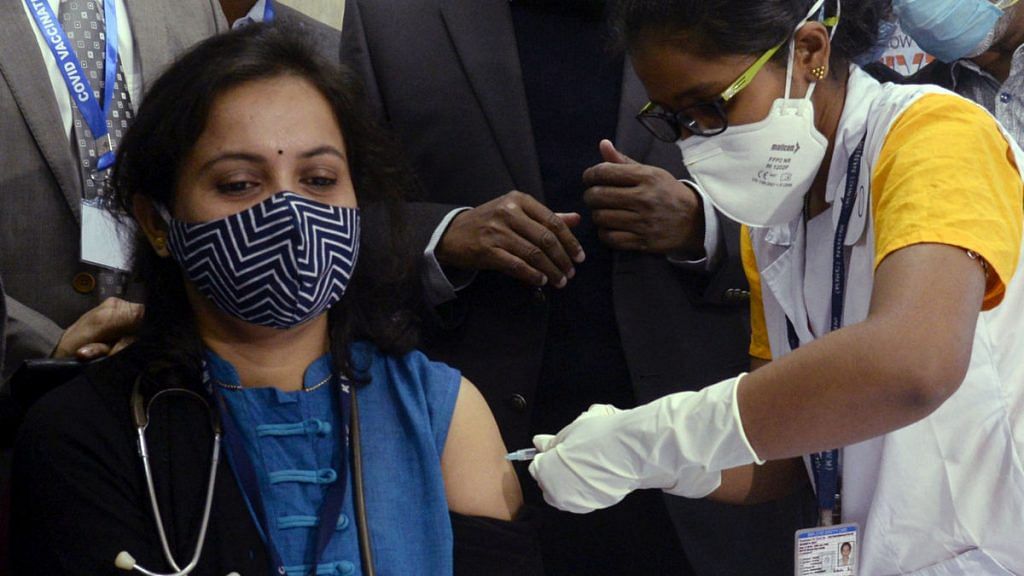New Delhi: At least 20 per cent of people found to be seropositive in a survey last year lost their neutralising antibody levels in the subsequent six months, according to a nationwide survey by the Council of Scientific & Industrial Research (CSIR). This, the researchers say, could partly explain why India is seeing a fresh surge in Covid-19 cases.
A team of researchers from CSIR institutes across India conducted a sero-prevalence survey in August and September 2020. The results showed that 1 million (10 lakh) people may have been exposed to SARS-CoV-2 — the virus that causes Covid-19 — since the beginning of the pandemic.
Covid serological surveys analyse the number of people who have developed antibodies to the virus. Such surveys offer a rough estimate on how much of the population has been exposed to the virus.
According to Shantanu Sengupta, professor at CSIR’s Institute of Genomics and Integrative Biology in Delhi, apart from revealing the extent of infections, their survey also showed that seropositivity levels within a population are predictive of the pandemic’s future trends.
The CSIR serosurvey was conducted across its constituent laboratories and centres all over India. Of the 10,427 volunteers surveyed, as many as 1,058 (10.14 per cent) tested positive for SARS-CoV-2 anti-nucleocapsid (anti-NC) antibodies, the kind that act against the outer protein shell of the virus.
Three-fourth of those who were seropositive recalled no symptoms, according to the researchers.
The researchers then conducted repeat serology tests on those found to be seropositive — on 607 people after three months and 175 people after six months. Among the latter, 20 per cent were found to be vulnerable to coronavirus reinfection, the researchers said.
“We were looking at the stability of the antibodies. We found that although in most people antibodies are intact even after six months, in 20 per cent of the cases the neutralising antibodies went below the acceptable threshold,” Sengupta said.
“This means that people who were infected six months earlier are now fresh candidates for reinfections. This would in part explain why we are seeing the rise in new Covid-19 cases,” he said.
The research has been accepted for publication in the peer-reviewed journal, eLife, and is likely to be published later this month.
Also Read: WHO and China probed coronavirus origin. And neither of them liked the results
Predicting trends
Speaking to ThePrint, Sengupta said serosurveys can be used to predict infections in the near future.
“We looked at the TPR (test positivity ratio, the share of positive diagnoses in Covid tests) 15 and 30 days before and after our serosurvey. Wherever the seropositivity was over 10 per cent, there was an immediate decline in TPR over the next 15 days,” he added.
The research, Sengupta said, also revealed that national-level serosurveys are important to understanding the true extent of Covid spread, and the percentage of population that remains vulnerable.
To elucidate the findings, Sengupta pointed out that several state- and city-level serosurveys had indicated up to 50 per cent seropositivity in states like Maharashtra, which continues to lead India’s Covid surge. A survey conducted in Pune between July and August, for example, showed over 50 per cent seropositivity.
“However, when we conducted a serosurvey of Pune, we found a seropositivity of less than 10 per cent,” Sengupta said.
“The previous survey conducted (by IISER), which had shown high seropositivity, focused on the top five worst-affected districts of Pune. Naturally, those areas are bound to have high (sero)positivity,” he said.
The recent surge in Covid cases in the city indicates that the number of people initially exposed to the virus was in fact much fewer than estimated, he added.
Local serosurvey results reported by the media made people complacent, Sengupta added, with many believing that the population in their region had achieved herd immunity to Covid-19.
(Edited by Sunanda Ranjan)
Also Read: Kerala sero survey finds 10.76% people with Covid antibodies, police personnel top the list
